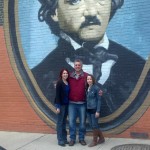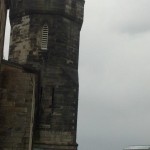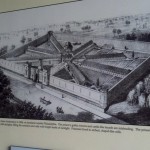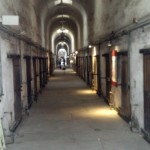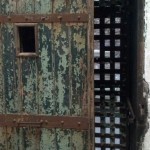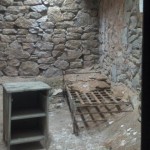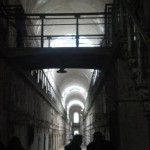…the everlasting stranger, who had walked its stones, and
breathed its air, and, as a stranger, looked into its million
dark and driven faces, and who could never make the city’s
life his own.
—Thomas Wolfe: Of Time and the River
__________________________________
“I’m going to be in Philadelphia,” she emailed me a month ago. “Over Easter Sunday. What are you doing that day? Do you have anything lined up?” Oh, boy, I thought. Just watch. She’s going to invite me to Philly. The city. I hate cities. But I answered. Nope, got nothing going on. My church is having an Easter service, sure. And I was planning to be there. But nobody’s invited me home for lunch afterward, or anything. So I’m not committed. Actually, I’d say I’m free.
And a few nights later she called me. Janice, my niece, the wandering efficiency specialist for Waste Management. They fly her all over the country. And that weekend, she would be in Philly. Could I come in for the day on Sunday? Wilm was coming on Friday evening, already. “We’re going to be tourists in the city all day Saturday. Come over then, if you want. You can get a room at my Hotel.” When I didn’t bite, she went on. “It would be great if you could come in Sunday, then, to hang out.” Gaaah, I thought. I knew it. I knew she was going to invite me in there.
I don’t like cities. I don’t trust cities. I don’t go to cities, unless I have to. Doesn’t matter what size. I even avoid downtown Lancaster, for crying out loud. The radius of my daily world always skirts the edges of any city. And now Janice was inviting me into a real, big city. Philadelphia. And I couldn’t turn that down. Didn’t want to. We haven’t seen each other since Beach Week, back in September. I mean, I’ve got to do what it takes to get there. And Philly isn’t that far. I couldn’t see driving, though. I’d take the train.
So that’s what we decided, and that’s how we left it, back then. And I put it out of my mind. No sense fretting over anything. The day would come, I’d walk into it, and it would be fine.
And last week, I checked the Amtrak schedule. A train left Lancaster for Philly at 8 AM. And at 10. The second one would work best, I figured. Give me a little more time. And so, last Sunday morning, I packed a few items in my messenger’s bag and took off for Lancaster. Parked and walked in, past the little booth. The attendant greeted me cheerfully. I’m parking for the day, I told him. “Five bucks,” he said. “What’s your parking spot number?” I didn’t even check, I said. It’s that blue Dodge pickup out there. “That’s fine,” he said, handing me my receipt. “I’m taking a walk out there in a little bit. I’m sure I’ll recognize your truck. I’ll get the number then.” I thanked him and walked into the station.
The Lancaster train station is a dump. Old and battered. They’re trying to repair it some, but I think it’s falling apart faster than they can fix it up. Cheerful little signs stood here and there. Bear with us as we remodel. The ticket lady was cheerful and friendly, too, I gotta say. Out there working on Easter morning. Nineteen bucks. That’s what it cost one way. You can’t beat that. You could never drive in for that. “Happy Easter,” the ticket lady proclaimed, handing me my ticket. Happy Easter to you, too, I said.
I was a good half hour early. A few other passengers were scattered about. More were coming in. I took a seat on a long bench and looked around at the other travelers. They were of every stripe and nature, looked like. There was one big difference from back in the days when I used to travel the land by Greyhound. Back then, people talked to each other. Chatted. Where are you going? We connected, even though we knew we’d never see each other again.
I don’t see how anyone connects with other passengers these days. Everyone is wired. Either pawing at their cell phone screens, cruising the internet on their iPads and laptops, or listening to music through ear plugs connected to their phones. You can hear the music blasting if you’re sitting close by. Brains are frying. And I’m not knocking it, people doing that. It’s just where we are. It is what it is. I just miss how it was.
It’s been years since I traveled anywhere on the train, or any public transportation. The last time was back in May of 2000, when I boarded Amtrak for Clemson, South Carolina, to visit my brother Nathan for one last bachelor’s party before Ellen and I got married in August. That party came down, four guys in a rented RV camper parked inside the oval of the Coca Cola 600 for two days while the races roared on around us. But that’s another story.
On the trip down, I wandered about in the train. In the snack/lounge car, I chatted for a while with a lady who was playing solitaire with real cards. And later, as the sun set and dusk settled over the land, I sat at a table with a small group of guys and we passed around a paper bag holding a pint of Jim Beam that had somehow magically appeared from someone’s pocket. We poured shots from the bottle into our plastic cups of Coke and ice when the attendants weren’t looking. It was all quite illegal, bringing your own whiskey to drink on the train, which of course made it taste even better.
And we sat there in a little knot around the table, talking. A couple of black guys from Philly, heading south to see family. A traveling salesman of some kind. Another guy, I can’t remember where he was going. None of us knew each other. We’d never met before, anywhere. But we talked and talked like old friends about a whole lot of things as darkness closed in and the train pulsed and throbbed into the night. Eventually the little pint bottle was emptied, and we all drifted off to find our seats and settle in to sleep. I never saw any of them again, nor expected to.
That’s how you ride a train.
The ticket lady’s voice blared over the loud speaker. Due to the mechanical problems, the westbound train was running 25 minutes late. That’s Amtrak for you. It’s run by the government. Highly unreliable, and, of course, loses billions of dollars every year. But I was relieved, because I was heading east, not west. My train was running on time. Knock on wood.
At ten o’clock, when the train pulled in and hissed to a stop, about 50 people had somehow materialized to get on board. The doors whooshed open, and we poured in. The coaches were half empty, so I had no problem finding a seat for myself. The train slid out, starting so smoothly that you wouldn’t even know you’re moving unless you looked out the window. In a few minutes, we were heading east full speed. I texted Janice. I’m on board. Yay! She texted back.
And I sat there and looked out the window. From a train, you see the underbelly of things. The backyards of homes and businesses. Where people put stuff they don’t want you to see from the road. Grills with tattered covers. Old junk cars. Stacks of firewood. Piles of this and that. Old pop-up campers and junk machinery. It all slid by as we headed toward Gap. And then we swooshed through the little town. I looked for the steeple of my church. Chestnut Street Chapel. And there it was. I glanced at my watch. It was 10:20. On most Sunday mornings that’s about the exact moment I arrive for church. But not this morning. They’d have Easter services without me.
Atglen passed, and other little towns. All with their decrepit old train stations. No longer used at all, many of them. I remember my father talking about when he was a little boy in Daviess County. How they would get on the train in Montgomery, and head west to Washington or east to Loogootee. He saw the high point of steam train transportation in this country. Back when the rails were an important connection to the outside world.
One of my earliest memories came on the train. I was probably about three years old. We were traveling to a funeral in Daviess, where I saw my first view of death. A grandmother, I believe, faintly recalled, lying in a coffin wearing wire-rimmed glasses. I remember more vividly the train trip to the funeral, how the towering dome of the train station fascinated me. I looked up in awe, imagining exotic and distant places, perhaps, even, heaven itself. And I remember how thirsty I was that night on the train, and there was no water. I cried and cried. Mom, Mom. I’m thirsty. She offered me what she had, an apple. “Eat that,” she said soothingly. “You can have water when we get there.” I’ve looked back on that memory now and then over the years, and wondered how my tears must have made her feel.
After a few stops at small town stations, we approached the outskirts of Philadelphia. I looked out at the rows and rows of bleak tenant houses. Slums, is what they are. Who could live there? Who would want to? Maybe people are trapped in their circumstances, I thought. I’d rather live in a tent out in the country.
We slid into the 30th Street Station a few minutes after eleven, right on time. I walked up. No Janice or Wilm. I’m here, I texted. We’re on our way, she texted back. A few minutes later Wilm walked in. I waved at her, and we walked out to where Janice was waiting in her rental car. I got in and gave her a big hug. Janice, dear. And then she shot right out into the traffic and we headed toward downtown.
Mostly, I hate cities because I hate driving in them. Well, that, and getting lost if you don’t know your way around, lost in some bad section where you’ll get killed for looking at someone wrong, or just for being there. Get someone else to drive, and I’m fine. Within minutes, I saw that Janice was utterly fearless. Even though she didn’t know the city that well. Wilm sat in the back seat with a map, and calmly called out directions. Once or twice, we missed our turn and had to loop around again. No problem.
They had the day pretty much planned. First, a late brunch at Silk City Diner, a place that was featured on the hit TV show, Diners, Drive-ins, and Dives. A show I happen to watch now and then, and enjoy very much. I never saw that episode, though. We parked and walked in. A classic little diner, right here in the city. I was amazed. This was the kind of place you find in small towns. We didn’t wait long to be seated at a booth in the back corner. And we ordered breakfast, good greasy food that only diners serve. And Janice and I caught up. She’s been so busy traveling and working all around the country that it makes my head spin. Houston. LA. Boston. Detroit. Buffalo. And other cities. The girl gets around. I can’t imagine such a hectic travel schedule, although at her young age I probably could have.
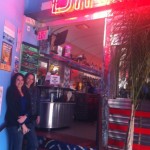
Waiting for a table. Janice and Wilm.
The food was better than advertised, and after that we headed out. Janice and Wilm had a few things planned. Touristy things. “We’re tourists.” Janice said. “And not one bit ashamed of it.” First stop was a few blocks down from the diner. The German Society of Pennsylvania. Of course they were closed. But we stood outside and took pictures. “We take lots of pictures,” Janice said. “Of everything and every place. That way, we can go and look it up on the internet and read all about it.” Made some sort of mad sense to me. We headed on then, for the Edgar Allan Poe house. Stood by the big mural and snapped pics. Three young Europeans, two guys and a girl, were snapping pics, too. So Janice handed the girl her phone and asked her to take a pic of the three of us. She gladly obliged. I didn’t even know there was an Edgar Allan Poe house in Philly. I thought he was pretty much a Baltimore guy. I mean, the Ravens are named after his famous poem, and all.
And then we headed out for the main activity Janice had planned. She had texted me a few days before. Hey, we’d like to go tour an old historic prison, here in Philly. Eastern State Penitentiary. It’s the oldest prison in the country. I texted back. Whatever you plan is fine, as long as we can hang out. A prison is going to get me all gloomy and depressed. But, hey, I’m game.
I hate prisons. And I hate the fact that this country has the highest incarceration rate in the world. It’s one of my deepest passions, this injustice, because about 75% of the current prison population in America could be free and productive people. The only reason they are behind bars is because of arbitrary state and federal laws. Most prisoners have committed no crime against any other human being. They simply ran afoul of some insane law, often involving drugs.
It is a harsh and brutal thing, to deny freedom to any human being for any reason. I’m not saying it’s never justified. It is, of course, for actual violent criminals. But those are relatively rare, when you look at who all is incarcerated. And here we are, feeding the giant private corporations that run prisons. Laws are passed and countless people are snagged in the dragnets and locked up, simply for profit. And that is a vile and contemptible crime against all of humanity. It really is. It makes me half crazy, when I stop and think about it, absorb it.
After merrily missing a turn, and looping around a time or two, Janice got us on the right street. And we drove on out. I figured we had a ways to go. But suddenly, there it loomed on the right. A huge castle complex. Old, old stone walls, thirty feet high, with turrets jutting up here and there. I pointed and yelled. The prison. That has to be it. And Janice and Wilm agreed. It had to be.
Not only is Janice a fearless driver in the city, she also has an uncanny knack for finding parking spots where there should be none. And right at the end of the row of parked cars in front of the prison, at the very last possible spot, it was open. She swooped in. We got out. The day was gloomy and overcast. The walls towered high above us. We looked up in awe. I felt my spirit closing in around me, like a cocoon. How many untold unfortunate souls had gazed upon what I was seeing, knowing that they were entering those walls against their will? Knowing they would be held there, to pay their “debt” to society? I couldn’t fathom it at that moment. But I could feel it, their spirit of despair.
We walked in, and paid the admission. They gave us each a little electronic keypad with headsets. It’s all pretty much a self-tour. You walk through. See a sign, with information and a number. You punch in that number, and a voice speaks. Tells you what happened in history. Right on the spot where you’re standing.
It was a bleak and desolate place. All of it. The very concept of its birth appalled me. You take people who have broken the law. Stuff them in dreary stone cells. Keep them in isolation, so they can be penitent of the wrongs they’ve done. No noise. No nothing. For 23 hours a day, day after day. I don’t know who dreamed up this concept. Whoever did was a sadist. Period.
And we walked through. Took the tour, like the tourists we were. The place is crumpling. There is a central hub. All cell blocks flow from that hub. We stood and looked into the cells. Tiny, cramped rooms, with entrances so small you had to bend over to get in. Most of the cells were empty and crumpling, but a few were still furnished with a hard iron bed, a little tiny desk, and a stool. It was all so bleak and so hopeless. There was nothing redeeming about the place. Nothing at all. The vision that had conceived it failed spectacularly.
The air is heavy, the place is thick with the spirits of the people who were wrongfully imprisoned and tortured there. It really is. I wouldn’t want to be anywhere around that area after dark. And I wouldn’t live within a mile of that site. I told Janice. I wish they would just level this place. All of it. The thirty-foot high walls. I don’t care how old they are. They should be leveled. And she asked me. “If they would do that, how would we ever sense the wrongs that were done here?” Yeah, you got a point, I said.
In the Bible, prisoners and captives are almost universally described with sympathy and compassion. Set the captives free. Visit the poor and the sick in prison. Care for the unloved, the forgotten. All of which tells me that throughout the long march of recorded history, the vast, vast majority of incarcerations were arbitrary and brutally unjust. People were thrown into castle dungeons and dank holes in the open ground simply on the whim of the king or his corrupt bureaucrats. Or enslaved as the bounty of war. The Lord’s heart has always been open to the cries of the oppressed. Should ours be any less so? Why, then, are so many “Christians” today so garishly eager to “lock’em up and throw away the key” for even minor nonviolent infractions? I think it’s time a whole lot of us searched our own hearts for that answer.
Eastern State Penitentiary remains today, a bleak and desolate ten-acre monument to the evil that is the state. It always was evil, the state. It always will be. It doesn’t matter who’s running it. Whether it’s the Quakers. The Puritans. Or the gangs of murderous goons that infest the cesspool that is Washington, D.C., today. Goons from both parties. If you trust the state in any capacity, for any service, for any promise, you have no true concept of what it is to be free. The state is a monster. A crooning monster, sometimes, but a monster nonetheless. It will arbitrarily reduce you to subhuman status. As a person to be controlled, and if need be, caged, because it says so. Just like that, for no reason other than its own written “laws.” It will continue to destroy innocent lives because it can, at least until enough people rise to stand against the beast. And call it what it is. And that’s about all I got to say about the matter.
Under gloomy skies, we took our time for the two-plus hours of our tour, pretty much walking through every cell block. As we walked out and returned to the car, the rain came down in a steady drizzle, which seemed very fitting for the moment. We settled in and drove around to find a coffee shop that was open on Easter Day. And we found one. A Starbucks.
After drinking coffee and chatting about what we’d seen so far, we headed back to the Loews Hotel, where Janice was staying. A fine old place, right downtown. We hung out in the lounge, while Janice downloaded her day’s haul of photos. And then we went up to her room and relaxed for an hour. Shortly after six, Janice ran us back to the train station. The train was right on time, and Wilm and I boarded for Lancaster at seven o’clock.
The cars were packed, heading west. And right on time, we arrived in Lancaster. I dragged Wilm’s luggage out to the parking lot, then got into my truck and headed for New Holland. At exactly 8:45, I walked into my home. Exhausted, but exhilarated, somehow. It was a good day. An odd day, because I went to the city and back. For me, that’s saying something.
I’m thinking, though, that maybe I should get out a little more.
************************************************************
Well, last week I hit one more little milestone. The kind of thing you never pursue or expect, the kind of thing that just happens on its own or doesn’t. And if it doesn’t, you never know, because you never looked for it. I was featured on my first ever magazine cover. Kind of a wild feeling, I have to say. Here’s how it all came down.
When the book came out in 2011, I never notified any of the schools I’d graduated from. Not Vincennes University. Not Bob Jones. And not Dickinson Law. I just didn’t feel like saying, hey, look what I accomplished. Here’s my book, check it out. I mean, a million other authors are doing that every year, bugging people from their pasts. I figured if the book moved at all, someone from those schools would notice at some point. And if no one did, that would be OK, too.
Then, last fall, I attended the 15th reunion of the class of 1997, at what is now Penn State/Dickinson Law. Reconnected with a bunch of my old law school classmates. Some of them had heard of the book. And I just happened to have a case of copies in the trunk. I sold and signed them at a discount for my old friends. And somehow a copy made its way to the front office. A few weeks later, an email arrived from Crystal Stryker, Marketing and Communications Manager at the school. She’d read the book. Would I be interested in doing an interview? She wanted to publish an article in The Lexicon, the law school’s alumni magazine. Of course, I said. I’d like that a lot.
So a month or so later, she drove out to see me at work. I showed her around at Graber, what I did, the operation of the business. We got along great. A month or two later, she returned with a photographer. Wow, I thought. They really mean business. She’s going to publish a piece about me. And she did. It’s a first for me, to make the cover of any magazine. And I am genuinely honored.
I don’t generally get involved in discussions about writing, much. Write as and how you want. Whatever works for you is fine. Recently, though, a meme on Facebook caught my attention, a quote from a lady. I guess she was a writer. “The role of the writer is not to say what we can all say, but what we are unable to say.” And I thought, hmm, why would anyone analyze it to that extent, what writing is? And it sounds a little complicated, anyway. If you think you’re saying what others are unable to say, you’re probably a little too focused on yourself. And that self-focus will affect your voice. It has to. There’s no way it can’t.
I’ve said it before, a few times. I guess I’ll say it again, then shut up for a while about writing. Everyone has an opinion, seems like. Here’s mine. The role of the writer is not to “say what we are unable to say.” It’s not to “make a difference,” either. The role of the writer is to live and speak from the heart. You write from where you are. Wherever that is. And you keep walking forward into life. It really is that simple.
Share


